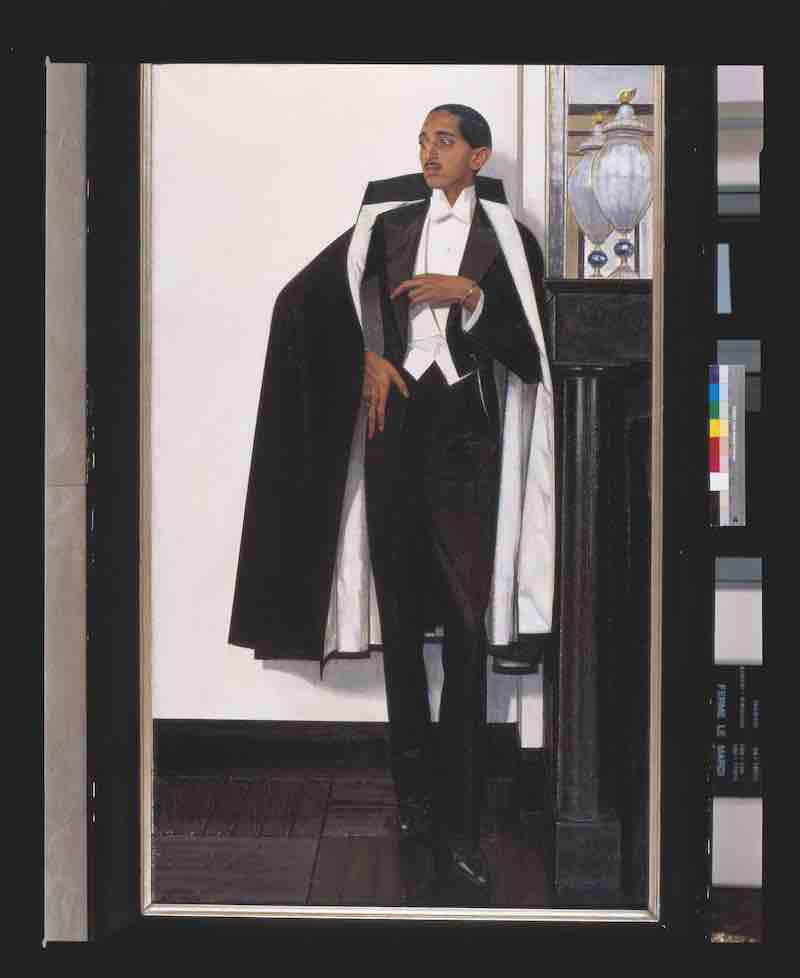'Moderne Maharajah, un mécène des années 30' will showcase over 500 objects from the Manik Bagh Palace, Indore, India, which reflect the artistic exchange between Europe and India, due to the legendary taste of the Maharaja of Indore (1908-1961) and his spouse Maharani Sanyogita Bai Devi (1914-1937)
The Maharaja of Indore in Western dress, 1929, painted by Bernard Boutet de Moncel ©Adagp, Paris, 2019

Yashwant Rao Holkar II spent his youth surrounded by the luxury which princes of India were then able to afford. He was sent to Oxford to study during the 1920s guided by the French-speaking private tutor Dr. Marcel Hardy who introduced him to modern European artists.
Both German modern architect Eckart Multhesius (1904-1989) and French artististic advisor and writer Henri-Pierre Roche linked to the avant-garde, travelled with the young prince in England, Germany and France exploring art venues and artists' workshops. The young aristocrat's remarkable visionary taste for Modernist design was formed during these voyages.
After his father abdicated in 1926, Yashwant Rao Holkar II acceded to the throne as Maharaja of Indore, now entitled to vast wealth and influence. In 1929, inspired by French collector and couturier Jacques Doucet, the young Maharaja decided to construct a palace in Indore. His mentor, German architect Multhesius, was put in charge of the project. The most innovative of materials of the Modernist period were used such as metal, sytnthetic leather and glass and combined with contemprary fittings, furniture and colour combinations. Nearly 20 interior designers furnished the now iconic rooms of the princely abode.
The layout of the exhibtion begins with the introduction to the Majaraja of Indore and to the Holkar dynasty, photos and information also refer to the vast international circle of friends and connections formed over the years. The recreation of his office, the royal bedrooms and the library are followed by displays of the unique objects supplemented by hitherto unknown films by Muthesius of the royal couple at home and during traditional ceremonies.
Among the most emblematic pieces are the Transat armchairs by Irish Eileen Gray, a pair of red synthetic leather armcharis with integrated lamps by Multhesius, beds in methal and glass by the French pair Louis Sognot and Charlotte Alix together with rugs by French painter and weaver Silvia Bruhns for the palace floors.
As patron of the arts, the Maharaja had access to the finest of china and ceramics by Jean Luce, silverware by Jean Puiforcat and the most exquisite jewelery from Van Cleef & Arpels, Harry Winston and Chaumet, for himself and his spouse the Maharani. Sketches, photos of these pieces, together with Constantin Brancusi's drawings for a Meditation Temple and a plaster model of his sculpture 'Bird in Space', of which the Prince commissioned three versions between 1933 and 1936 between 1933 and 1936 are also revealed.
Both German modern architect Eckart Multhesius (1904-1989) and French artististic advisor and writer Henri-Pierre Roche linked to the avant-garde, travelled with the young prince in England, Germany and France exploring art venues and artists' workshops. The young aristocrat's remarkable visionary taste for Modernist design was formed during these voyages.
After his father abdicated in 1926, Yashwant Rao Holkar II acceded to the throne as Maharaja of Indore, now entitled to vast wealth and influence. In 1929, inspired by French collector and couturier Jacques Doucet, the young Maharaja decided to construct a palace in Indore. His mentor, German architect Multhesius, was put in charge of the project. The most innovative of materials of the Modernist period were used such as metal, sytnthetic leather and glass and combined with contemprary fittings, furniture and colour combinations. Nearly 20 interior designers furnished the now iconic rooms of the princely abode.
The layout of the exhibtion begins with the introduction to the Majaraja of Indore and to the Holkar dynasty, photos and information also refer to the vast international circle of friends and connections formed over the years. The recreation of his office, the royal bedrooms and the library are followed by displays of the unique objects supplemented by hitherto unknown films by Muthesius of the royal couple at home and during traditional ceremonies.
Among the most emblematic pieces are the Transat armchairs by Irish Eileen Gray, a pair of red synthetic leather armcharis with integrated lamps by Multhesius, beds in methal and glass by the French pair Louis Sognot and Charlotte Alix together with rugs by French painter and weaver Silvia Bruhns for the palace floors.
As patron of the arts, the Maharaja had access to the finest of china and ceramics by Jean Luce, silverware by Jean Puiforcat and the most exquisite jewelery from Van Cleef & Arpels, Harry Winston and Chaumet, for himself and his spouse the Maharani. Sketches, photos of these pieces, together with Constantin Brancusi's drawings for a Meditation Temple and a plaster model of his sculpture 'Bird in Space', of which the Prince commissioned three versions between 1933 and 1936 between 1933 and 1936 are also revealed.
Photos from the show 'Modern Maharaja Yeshwant Rao Holkar II, patron of the arts'
Musée des Arts Décoratifs
107 rue de Rivoli, 75001 Paris
+33 (0) 1 44 55 57 50
métro : Palais-Royal, Pyramides, Tuileries
open from tuesdays until sundays from 11h until 18h
exceptionally open thursdays for the temporary shows
and the jewelery gallery until 21h
entry full price : 11€ and reduced price : 8,5€
107 rue de Rivoli, 75001 Paris
+33 (0) 1 44 55 57 50
métro : Palais-Royal, Pyramides, Tuileries
open from tuesdays until sundays from 11h until 18h
exceptionally open thursdays for the temporary shows
and the jewelery gallery until 21h
entry full price : 11€ and reduced price : 8,5€
